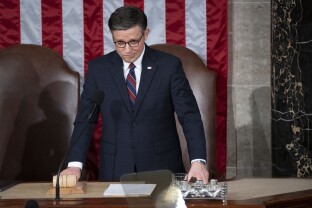Facing a widespread revolt on his plan to keep the government funded, Speaker Mike Johnson finally accepted reality Wednesday and chose one embarrassment over another: He pulled the bill from the House floor.
“We’re going to continue to work on this,” Johnson told reporters, saying conversations would continue into the weekend to “build consensus.”
“We’re having thoughtful conversations, family conversations, within the Republican conference, and I believe we’ll get there,” he said.
